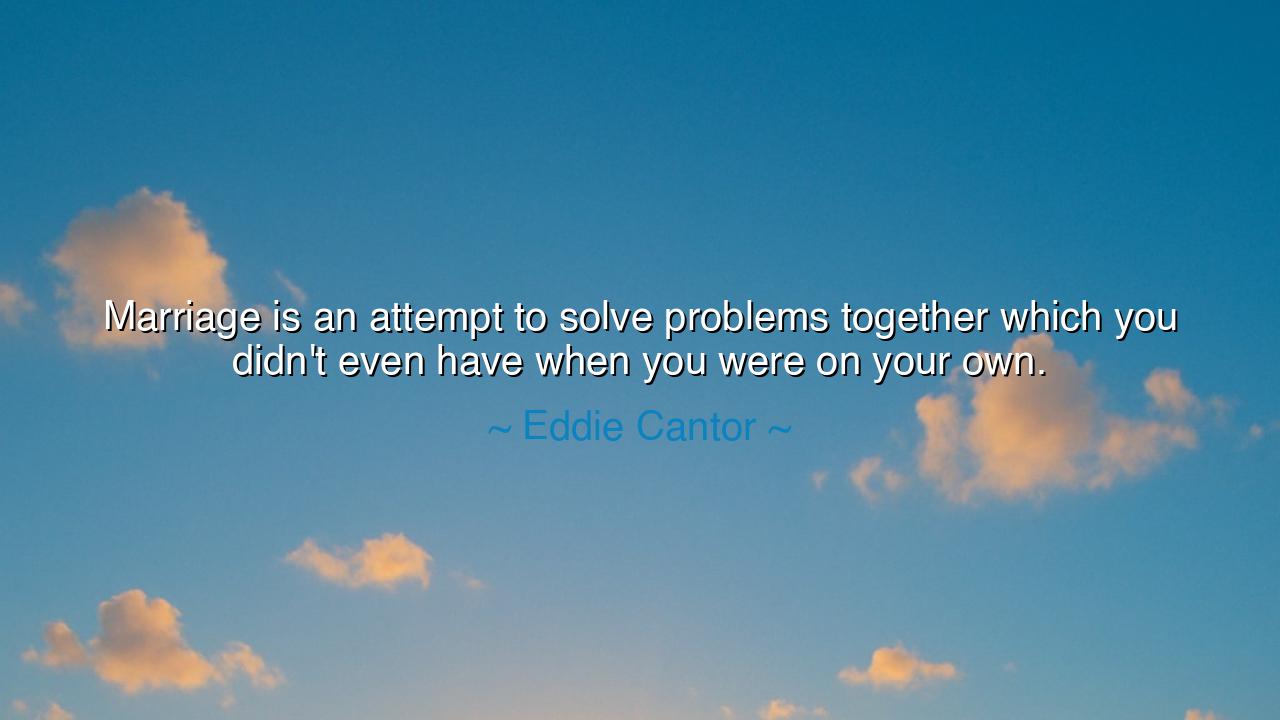
Marriage is an attempt to solve problems together which you
Marriage is an attempt to solve problems together which you didn't even have when you were on your own.






“Marriage is an attempt to solve problems together which you didn’t even have when you were on your own.” So said Eddie Cantor, with a humor that conceals deep truth, for laughter often carries the wisdom that tears cannot speak. In his jest lies the essence of human union, that sacred yet tumultuous journey where two souls join not merely in love, but in shared imperfection. What once was simple becomes complex; what once was solitary becomes intertwined. Yet in this struggle—this attempt to “solve problems together”—lies the quiet beauty of commitment, the forging of character through the fires of companionship.
In the ancient days, philosophers and poets spoke of marriage as both heaven and crucible—a bond ordained by destiny yet tested by the will of mortals. To join one’s life with another is to invite joy and chaos alike. Alone, a man or woman may live in peace, answerable only to their own desires. But when two hearts are bound, the storms of difference arise. The problems of which Cantor speaks are not the calamities of fate, but the small frictions born of proximity—the merging of habits, the clash of wills, the misunderstanding that blooms where love once seemed effortless. Yet, paradoxically, these very struggles are the soil in which understanding takes root.
Consider the tale of Odysseus and Penelope, the ancient symbols of endurance in love. Though oceans divided them for twenty years, their marriage endured storms both literal and unseen. When Odysseus returned from his long wanderings, he found not a maiden untouched by time, but a woman of equal strength—one who had borne loneliness, temptation, and doubt. Their reunion was not the bliss of newlyweds, but the hard-won peace of those who had faced life’s problems together, though apart. Theirs was a marriage tempered like steel, made strong through trial. They learned, as all must, that love is not sustained by ease, but by shared effort, patience, and the quiet art of forgiveness.
Cantor’s humor, then, is a mirror of truth: for the union that begins in laughter must often be maintained in humility. When two people stand beneath the canopy of vows, they imagine eternal harmony—but the universe, in its wisdom, gives them work instead of ease. It gives them the daily labor of empathy, the craft of compromise, the discipline of gentleness. Alone, they might have walked untroubled paths, but together they are asked to build a bridge across the waters of misunderstanding. This is no punishment, but a divine design—that in learning to understand another, one becomes more fully human.
In marriage, even the smallest matters become sacred tests. How one speaks in anger, how one forgives in silence, how one bears the weight of another’s sorrow—these are the unseen battles of the heart that forge true partnership. The problems that never existed in solitude are, in truth, the instruments through which the soul is refined. The ancients would say that love, like gold, must be purified by fire. So too, the shared challenges of marriage burn away selfishness and pride until only unity remains.
We must not be deceived, children of tomorrow: love is not the absence of conflict but the mastery of it. To be bound to another is to see oneself reflected, magnified, and sometimes opposed. One’s virtues are tested, one’s flaws revealed. But it is precisely through this mirror that wisdom grows. The single life teaches independence; the married life teaches interdependence—how to bear another’s burdens, how to rejoice in their triumphs, how to stand firm when both tremble. Those who endure together discover that problems are not curses but invitations to deepen their bond.
The lesson is clear and radiant: cherish not only the joys of marriage but its trials, for in them lies the true measure of love. When discord arises, remember that it is not a sign of failure, but a chance to practice patience, tenderness, and faith. Speak not to win, but to understand. Listen not to reply, but to heal. For marriage is not the promise of a perfect life, but the journey of two souls learning how to make one another whole.
So remember Eddie Cantor’s gentle jest—not as mockery, but as wisdom cloaked in laughter. To love is to labor, to share not only peace but struggle. If solitude offers ease, marriage offers meaning. And in that shared striving—those countless little problems faced hand in hand—there is born a love that no solitude could ever know: the love that survives not because it is effortless, but because it is chosen, again and again, in the face of imperfection.






AAdministratorAdministrator
Welcome, honored guests. Please leave a comment, we will respond soon